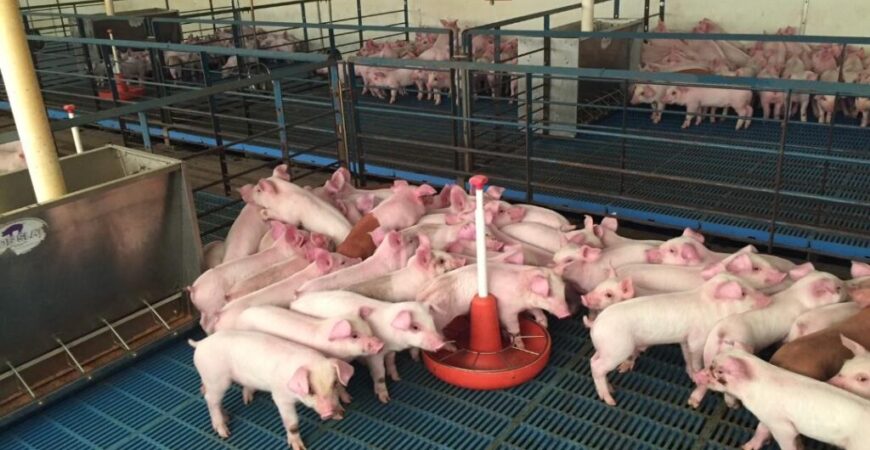In northern Duplin County, there is a farm that takes pride in being in its third generation of pork production. Herring Farm started in the 1930s with Leland Buck Herring, expanded with his son Curtis’ vision in the 1960s, and now continues with his grandson, Chad Herring.
“The most important part of our story is that we all still live here,” Chad said proudly as he toured the land with Duplin Journal. Leland started the farm as a sharecropper with five children and no particular passion for pigs—he may have even been allergic to them. “He did a lot of row crops,” Chad recalled.
But everything changed in 1965 when Leland’s son, Curtis, took on a 4-H project and raised nine feeder pigs to market weight. With the money he earned, Curtis reinvested in the farm and began steering the family business toward pork production.
“In 1970, we had a really tough winter. We had been keeping the pigs outside on the ground for years, but that year it froze, and we lost 75% of our livestock,” Chad remembered. “Grandpa said we either take the pigs inside or we get out of the pig business.”
The following year, the family started building pig barns. With manual controls in the old barn and power controls in the new barn, ventilation systems with curtains now help keep the pigs’ temperature regulated.
Over the years, the family has continued to evolve with the times. Chad’s father, Prentice Herring, left the farm to attend college and later worked for a shirt manufacturer in Wilmington. But in 1978, when Leland fell ill, Prentice returned to help Curtis manage the farm.
“Dad was the business guy, and uncle Curtis was more the mechanical. They worked together really well using each other’s strengths,” Chad said.
Like his dad, Chad also left the farm. He went to college, got a construction degree, and started working in that industry. Still, he ended up coming home as well because of the opportunity that only farm living can provide.
“I had the best childhood growing up on a farm, and I wanted to give my children the same kind of childhood I had growing up here,” Chad said, remembering.
“We were independent and had the whole process here from sow to finish until the mid-late 90s. We even made our own feed; that was one of my jobs in high school,” Chad remembered. The increased prices on corn in the 90s made self-made feed more difficult. Ultimately, the family chose to transition to becoming contract growers for Smithfield Foods.
“Smithfield Foods is vertically integrated. Contract growers own their farms and provide the labor, while Smithfield owns the pigs and feed to grow them. They also provide all the veterinarian care and medicine needed to take care of them,” Chad explained.
Farmers get paid based on feed conversion. “It is advantageous for the farmer to make sure there are not a lot of feed spills, be efficient with feed, and convert it to pork. We have advanced a lot over the years and can grow a lot more pork with a lot less feed now. At the nursery stage here, we can grow a pound of pork with about 1.5-1.6 pounds of feed,” Chad explained. “The better I take care of my animals, the better the pigs will be, and the better my pay will be. It just makes sense to take care of the animals.”
One of the controversies surrounding pork production is the myth that pig farmers are polluting drinking water. In 1997, a moratorium was placed on hog lagoons, limiting any new pig farms from developing. Even to this day, it is hard to become a pork farmer without buying old farms with existing lagoon permits and remodeling them. Permits are renewed every five years with public hearings, trying to impose more regulations and burdens on the farmer.
At Herring Pork Farm, man-made storage ponds leech to Coastal Bermuda grass fields that are harvested and fed to cattle. By law, the waste is regulated to be spread only at a rate that the grass is able to absorb and break down the nutrients. “We have a zero-discharge policy for this kind of wastewater system,” Chad said.
When Chad returned to the farm in 2007-2008, he said he made a commitment to it. He went to meetings and events to support pig farming, and he spoke as an advocate for the needs of farming families. In 2018, Chad Herring became the Executive Director of NC Farm Families, a nonprofit organization formed in 2015 to advocate for and speak on behalf of farm families in NC. With 40,000-50,000 followers on social media today, the organization shares farmer stories to re-educate the public.
“Farmers are just like everybody else (with lives, families to support, and sometimes other careers),” Chad said. “The modern farmer really has to be an activist. We need people to be advocates for this industry by attending meetings and speaking up for the needs of the farmers.”
 Twitter
Twitter Facebook
Facebook Instagram
Instagram






